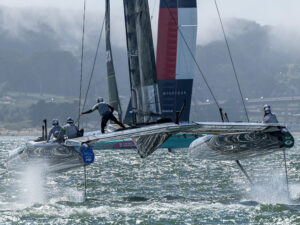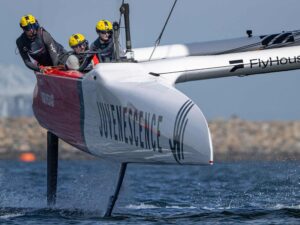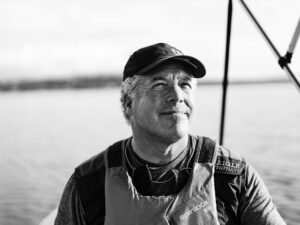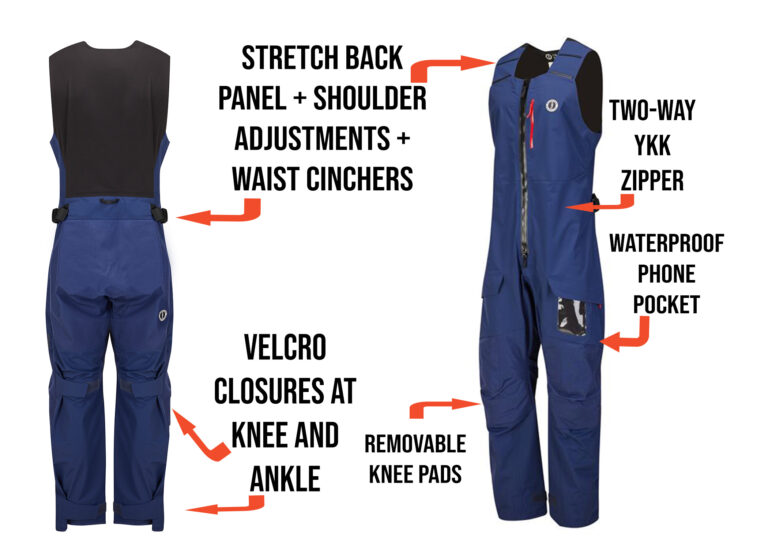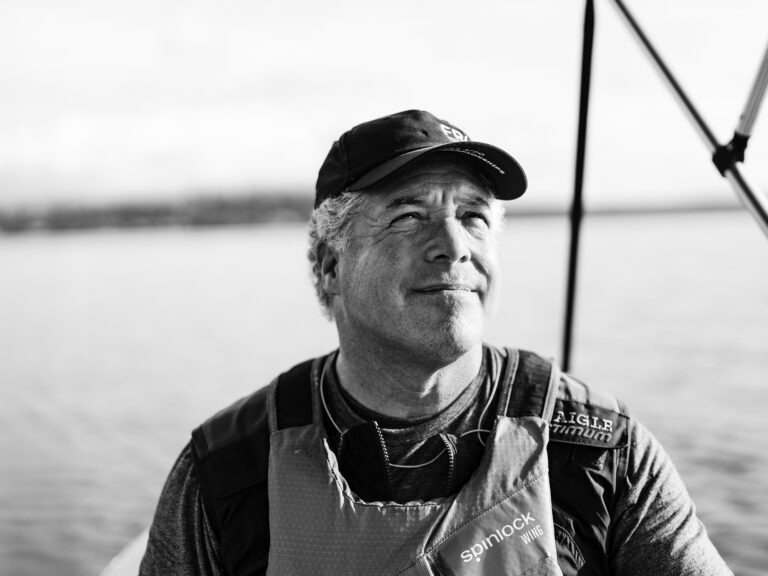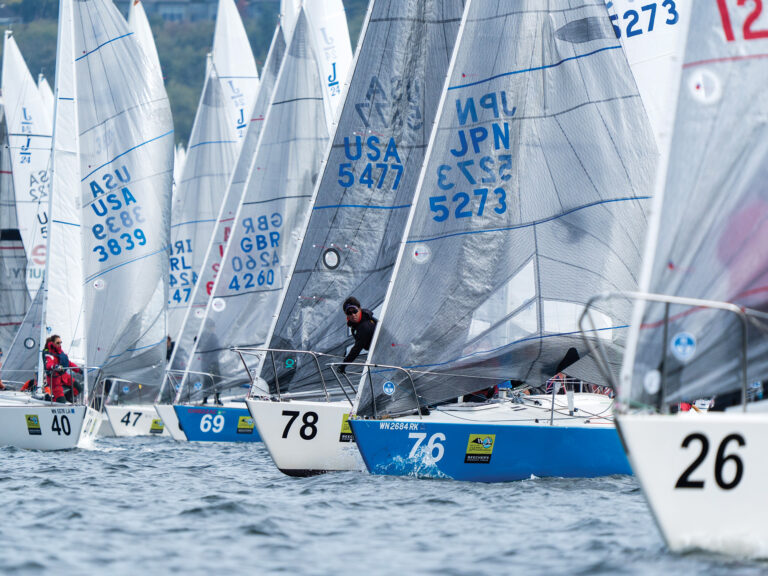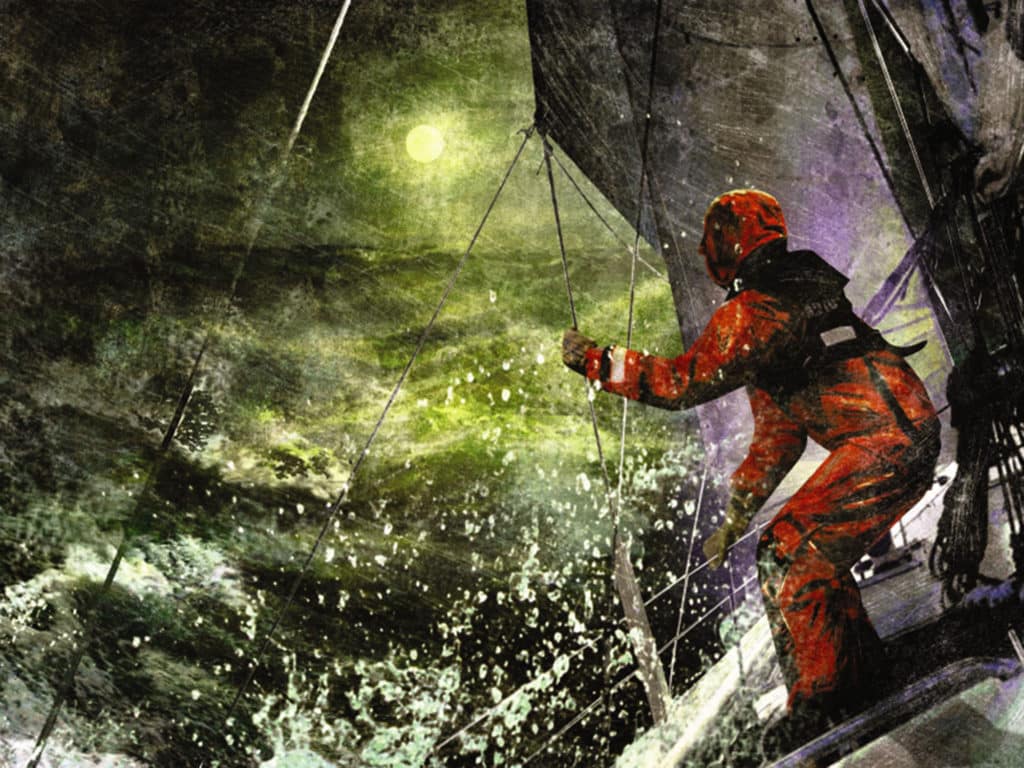
My watch reads 1:58 a.m. as I step up through the hatch and into a darkness so complete that focusing on the horizon causes an instantaneous shift in perspective—all the angles are turned counterclockwise. At the helm, shadowy figures sway, illuminated by the green glow of the compass. Beyond the transom, whitecaps cut through the black sea before everything vanishes under storm clouds.
It’s our second night in the Celtic Sea, and we are well past Land’s End, sailing north for the Fastnet Light. I climb up to the rail and sit between my pals Craig Nann and Adam Perlmutter. Clipping to the jackline, I peer over the side at waves, maybe 10 to 15 feet from peak to trough. Turning forward, the red digits of the mast display glow through the moisture: WINDSPD 31.
Adam’s chin is on his chest. Confused, I turn to Craig.
“He’s been seasick for a while now,” Craig quickly points a finger at his open mouth, imitating someone vomiting. He then jerks a thumb over his shoulder at the storm clouds behind us and says: “Squalls. This will get messy.”
A wave hits the bow, and our backs press against the lifelines.
I twist around to get a better look at the approaching weather. About 15 yards away, a wave crests like a black wall, its glassy surface blotting out everything behind it. Suddenly, there’s a knot in the pit of my stomach. It closes on us quickly. Our bow wave’s white foam looks well below the crest when the wave hits the hull under my boots, dangling over the side. Water jets up through my legs, and my chest bounces off the lifelines as a thick wall of ocean lands on my neck and shoulders. Below me, the boat’s 10,000-pound keel bulb looks to be just a few feet underwater.
Adam blurts out, “Been getting worse all watch!”
His anxiety infects me quickly. The salty taste in my mouth turns metallic. It’s what I call “mouth sweats.” I stare at the horizon line and pray that I don’t puke.
Breathe. Breathe. Breathe.
“Hey, guys!” someone bellows from the cockpit. “What sail is next?”
Sail change? I gotta go forward in this?
A creeping sensation of dread moves up to my throat, something I hadn’t felt in decades.
A quick glance at the red dial: WINDSPD 33-34.
From the helm, Jack Cummiskey yells: “We’re going to the jib top. Where’s Ted?”
Ted Cummiskey is already on the move, headed for the bow.
One of the boat’s veterans, Billy Schneider, comes forward from the helm and stops in front of the hatchway, raising his hands to cup his mouth.
“Hey, Ted! What track’s open?”
Ted can’t hear. Someone’s usually at the mast to relay messages fore and aft.
Sh-t! That’s me. But I don’t have the will to move. Fear has me in its grip, squeezing the nerve right out of me. I’ve been wondering all summer if I’m really cut out for this. Now it feels as if I’ve put myself in a situation I can’t handle.
Billy turns and yells something aft, but I am so far inside my head that I don’t hear it.
The sail change is going to happen, and if I don’t get up and do my job, someone else will—and this will be my last race on Snow Lion.
Back near the helm, Chris Huntington is pointing his long arm at the lone sailboat out beyond our stern.
“We’re keeping pace with her! Why are we changing sails?” he bellows.
Billy suddenly steps away from the hatch as our skipper, Larry Huntington, comes on deck.
Larry fills his lungs and yells, “Chris!”
Everyone turns to face him.
“OK,” he continues in his usual, steady skipper’s tone, “breeze is building, so let’s change to the jib top.”
Before Chris can say a word in protest, Larry raises his hand and says: “If it eases up, we’ll go back to the heavy jib. I’ll hand up the sail.”
As our skipper turns and disappears down the companionway, Chris steps forward next to Billy and jokingly says, “Good news is, I don’t think the heavy stuff’s coming down for a while.”
A broad smile flashes across Billy’s face as he rubs his hands together expectantly. “This is getting good!”
These guys aren’t scared. They’re enjoying it. This hit me, or rather my ego, like a hard slap. I’ve lost my confidence and my ability to get up and sail. Why?
I know the boat is more solid than most. The hull is Kevlar, and Larry has put all of his 40-plus years of experience sailing offshore into this boat. And the crew?
In the deadly 1979 Fastnet Race, Larry, Billy and then-19-year-old Chris had been aboard Carina, one of the great amateur offshore racing programs, in the worst conditions ever faced in this race. Force 11 winds with waves in excess of 40 feet caused havoc—75 boats capsized, 15 sailors died, and five boats sank.
I watch as Billy turns to yell at Jack about his steering—and it hits me. This is what they signed up for, and they are enjoying it. If the boat is good and the crew is experienced, then I’m the weak link. They picked me to come along, and I accepted, so it is on me to get up and try.
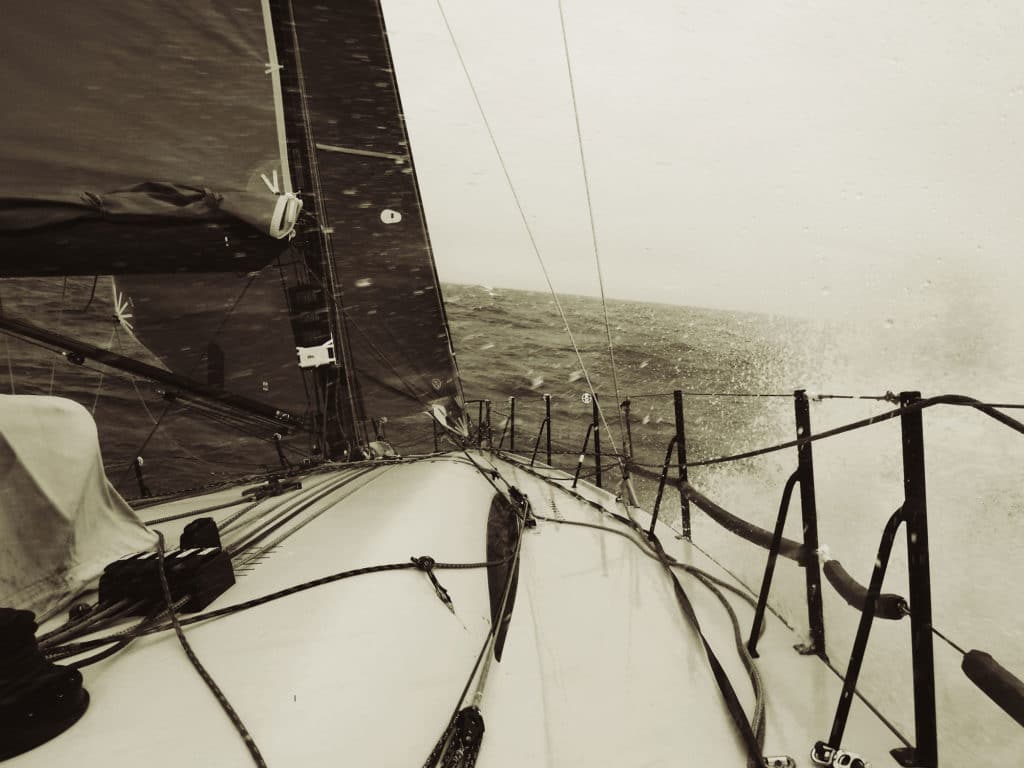
Lifeline in my left hand, tether in my right, I get to my feet and shuffle forward until I reach the shrouds. The mast is tilting away at about 15 degrees, so I drop back down to my knees, unclip my tether and start to crawl. Just as I do, the boat begins to stand upright. I spring to my feet, take two loping steps to the mast, and clip my tether to a halyard.
Behind me, the tall, lanky frame of Ben Millard creeps forward along the rail. At 19, Ben is the youngest of the new guys this season, which makes me, at 43, the oldest.
“Stuay!” I hear Howard Lapsley yelling to me from the hatch.
He stands up from the hatch and tosses the tack end of the jib toward me. I pass the sail forward to Ben and wait as Howard comes along the leeward rail, the ocean flashing under his boots. He ties the sheet to the clew and moves to the mast, while Ted connects the halyard to the head of the sail.
Howard turns and yells, “Ready forward!”
Jack booms,“Hoist!”
Howard and I pull and jump until Ted yells, “Made!”
Both of us are winded, but before I can take a breath, Craig’s growl booms over the wind: “Heavy jib ready to come down!”
Howard has already switched his tether and is sliding on his butt down to leeward. As I change my clip to the jackline, the boat heels way over, and I start sliding. My throat tightens again.
C’mon, just breathe!
Ben Millard yells, “Release the sheet!”
The loud groan of the sheet unwinding itself around the big winch drum gives way to the loud flogging of a sail snapping in the strong breeze.
Howard reaches out over the ocean to pull the clew of the heavy jib under the foot of the jib top. Ben and I grab the foot of the sail as Ted yells, “Jib down!”
Thousands of pounds of tension release from the halyard, and it vibrates down through the mast like a tuning fork. We all lean back to pull the sail inboard, peeling the heavy jib down, right under the jib top.
Gathering up the sail, I hear a loud thud before I’m thrown forward to the end of my tether. Just as my chest hits my harness, the wave lands hard on my back, knocks the wind out of me and tears the sail folds out of my hands. I watch it slip over the lifelines, but Howard leans out, catches a handful of cloth, and shoves the folds back into my arms.
After a few more exhausting pulls, Howard and I are holding the bulk of the jib. Ben moves forward and pulls the head of the sail out of the track, while Ted squirms forward, flat on his chest, wresting the tack from its shackle.
Howard yells, “We bagging this here?”
“Weight off the bow! Get that thing back!” Jack roars. I’m exhausted and itching to follow his order, but Ted isn’t done, and we can’t retreat without him.
Sweating profusely, I pull my jacket open at the neck, and the breeze rushes in, filling my jacket like a balloon.
“Guys, weight off the bow!” Craig’s growl turns my head in time to see Howard’s hand as he thrusts a sail tie toward me. Pulling the other end of the tie under the sail, he feeds it back up through the loop I’m holding and cinches the folds of sailcloth together like an hourglass. Howard quickly lashes one more tie around the sail, then hands the sail to Ben, who turns and scrambles to the cockpit. Ben and I slowly get to our feet and start dragging the sail back. Ted comes up beside us, pulling the tack over the rest of the sail—folding the sail in half.
Crack! Boom! An explosion like cannon fire goes off. Behind me, Ted yells, “Take this!”
He throws the sail at me and takes off for the bow.
A tremendous whip crack reverberates through the air—then I see it. The jib-top tack has broken loose. It’s flapping up in the breeze and smacking down the pulpit like a giant fly swatter. The steel grommet whacks the pulpit again and again.
The bigger concern? If that sail tears up the track, we’re dealing with an all-hands-on-deck, abandon-the-race kind of problem.
Something hits my leg. Below me, Ben is lying on his back, clinging to the heavy jib for dear life. He’s supposed to go forward, but he’s not going anywhere. I look up, straight at Jack. He takes one hand off the wheel, points a finger at me, jerks that hand back 6 inches and rams it straight at the bow.
Oh no…
I take a deep gulp of air, and out of my mouth comes, “Here we go!”
Jack asked. There’s no way I’m letting him down.
I drop the rest of the sail into Ben’s arms, and with an unexpected surge of adrenaline, turn on my heel and take off at a run to the bow.
Two steps, harness goes tight, feet fly out from under me, and I land flat on my backside. A jolt of pain shoots through my hip as I realize I forgot to unclip. Twisting around onto my knees, I free my clip and make a beeline for the bow, again.
Up ahead, Ted has his back against the jib and is sliding forward, flattening the sail against the pulpit as he goes. The boat lurches, I slip, and I’m on my ass again—this time sliding my right foot forward like a stolen-base runner. Momentum carries me across the foredeck and into the sail, just behind Ted. As I get up, Ted pins the sail tack between his knees. Without looking up, he shouts, “Pull the sail!”
I catch hold of the jib, but in 30-plus knots of breeze, the soaking-wet sail jumps right out of my hands. With another try, I get one hand on the foot of the sail and turn forward. Ted puts a sail tie through the grommet and threads it through the spare tack shackle. Standing up, he pulls the sail tie closed like a slipknot. With a second pull, the grommet is within inches of the tack shackle.
Ted yells, “Pull!” Using both hands, I throw all my weight into it, but the sail won’t budge.
“Pull the sail!” Ted yells again.
“I can’t!”
Suddenly, the boat drops off a wave. I’m thrown forward, my back slams against the pulpit. The hissing bow wave below is now close enough that spray covers my face. I try to get to my feet, but gravity has me pinned.
Ted looks up past the bow and drops the sail tie as he lunges forward, grabbing the pulpit, yelling, “Hang on!”
The whoosh of the bow wave vanishes as a wall of black ocean comes straight at us. I freeze as the pulpit plunges into the sea.
Deep breath. Freezing.
My left arm snaps straight as the ocean lifts me off the deck. I’m submerged when my hand starts to slip.
Don’t let go!
My feet float to the surface as my boots fill with water. In the darkness, time stretches out like an elastic.
I’m at the edge of my breath as the strain on my arm eases and the pulpit begins to rise.
Land inside the boat!
My eyes open in murky darkness as the white deck comes into focus.
My feet hit as my hand is ripped from the pulpit. The ocean sucks me down against the rail. Gasping for air, I get mostly seawater, swallowing a mouthful. A loud squeak catches my attention. It’s Ted’s boots shuffling forward. Something tugs under me. I roll over and watch the gray mass of sail slide forward. Getting to my knees, I help pull the foot of the sail forward.
RELATED: Offshore Schooled
Ted fits the shackle through the grommet. I hear it snap as he yells, “Made!”
The sail goes taut with the boom-boom-boom of the sheet loading on the winch. The boat begins to heel, so I start crawling up to the high side. I gasp for air as cold seawater gushes out of my sleeves, my neck—hell, everywhere.
With a wild expression in his eyes, Ted yells, “Let’s get outta here!”
I try to hustle, but my boots are heavy with seawater. Just past the shrouds, Ted drops into the first spot on the rail. I maneuver my way into the next open spot and wedge myself between the lifelines.
“Suddenly, the boat drops off a wave. I’m thrown forward; my back slams against the pulpit. The hissing bow wave below is now close enough that spray covers my face. I try to get to my feet, but gravity has me pinned.”
On my right, Billy is eyeing me with a smirk. My mind is racing, my whole body buzzing with adrenaline. Turning to Billy, I ask, “Permission to empty my boots?”
Billy’s shoulders shake with laughter as the boat rolls over another wave and gravity pulls a salty stream of seawater from my nose. As I cough and choke, Billy howls, using the back of his hand to wipe the tears from his eyes.
Then I hear, “Ted, Stuart—why don’t you two go below and get some dry gear?”
I turn around to see Larry with a look of genuine concern. I turn to catch Ted’s eye, but he is staring out at the ocean with a funny smirk on his face, quietly shaking his head and clearly not going anywhere.
I turn back to the skipper and say, “Larry, we’ll sit our watch as is.”
He smiles broadly as he steps into the hatch and adds, “OK. You two are big boys.”
Staring out at the circle of moonlight in the clouds, my mind swings back to the moment the wave hit us. The sea swallowed me whole. Inside the cold, dark wave, I felt no anxiety, no fear…just a kind of serene detachment. There was something else in the wave, something I couldn’t quite get to, and just as I reached for it, the sea spat me back out.
As I look out over the rail an hour or so later, I can’t remember why I’d been so scared to go forward in the first place. In that moment, I thought about something my dad once said: “Sometimes in life, things happen that change us, and we’re not the same after. Something of the experience fuses to our DNA. They become the jewels in our own internal clocks—reminding us who we are and shaping who we become.”
The moment inside that wave revealed something to me I hadn’t found in 43 years ashore—the difference between danger and my reaction to it: fear. I’d been scared by the storm conditions but in no immediate danger. However, inside the wave—in real, immediate danger—I wasn’t afraid.
Later that night, the experience made sense. Getting up to do that sail change was what made that moment possible. Life is in the doing. We don’t know what we’re made of until put to the test. The self-confidence gained from that experience comes with me everywhere. Sailing offshore puts us in situations we’d never find in our daily lives ashore. The insights gleaned from this experience, and others like it offshore, are among my most treasured moments.

